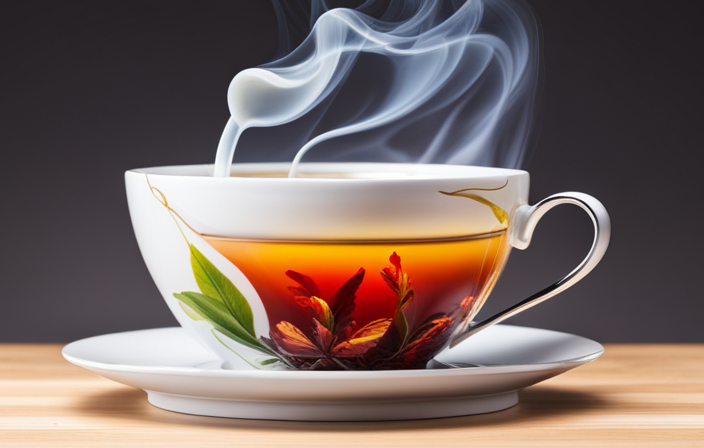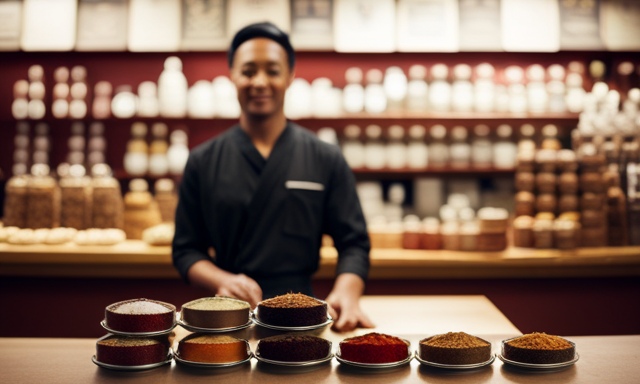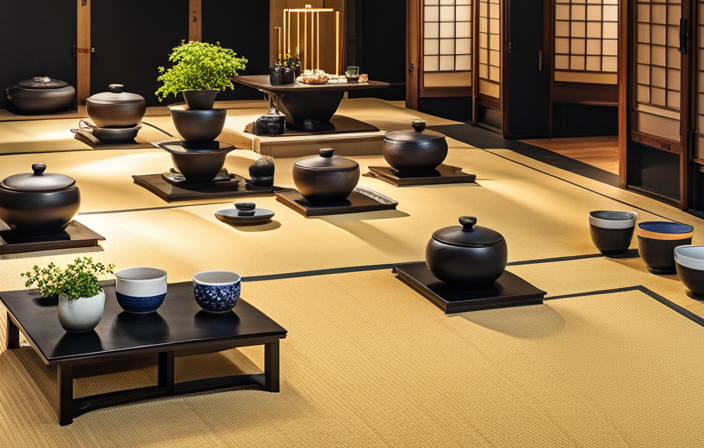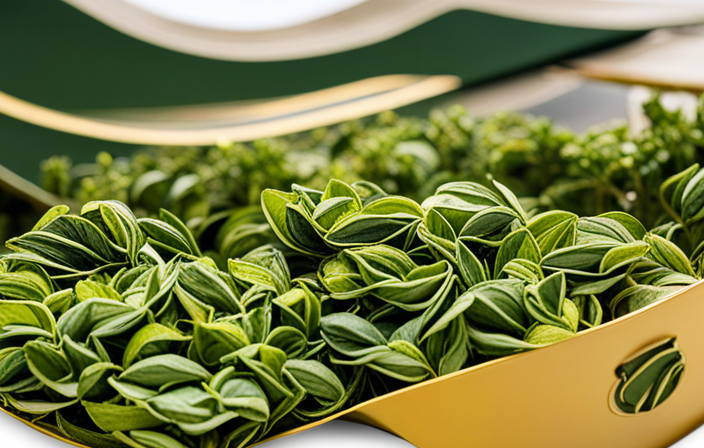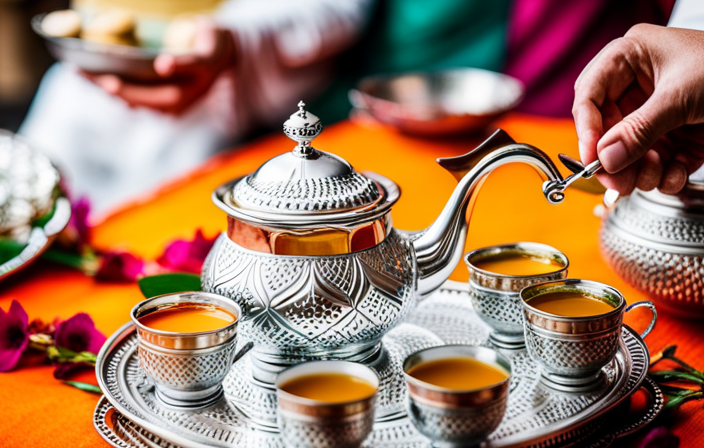As they say, the perfect brew of a cup of tea is an art. But fear not, my friends, for I am here to guide you through the intricate world of tea brewing.
In this article, we will explore the factors that determine the perfect cup, from the role of water temperature to the impact of tea leaf quality.
So sit back, relax, and let’s dive into the secrets of brewing the perfect cup of tea.
Key Takeaways
- Water temperature significantly impacts the taste and quality of the final cup of tea, with different types of tea requiring specific temperatures for optimal brewing.
- Using the appropriate quantity of tea leaves is essential for achieving the perfect brew, as too little or too much tea can result in a weak or overpowering cup.
- Brewing time influences the taste and strength of the tea, with steeping for too long making it bitter and too short brewing time lacking depth and flavor.
- The quality of tea leaves affects the overall taste and experience of the tea, with higher-grade leaves often resulting in a more refined and complex flavor profile.
The Role of Water Temperature
I can’t believe how much of a difference water temperature makes when brewing tea. The impact of water temperature on the final taste and quality of the tea can’t be overstated.
To achieve the optimal brewing temperature, it’s important to understand the characteristics of different types of tea. For delicate teas like green and white teas, a lower temperature of around 170-180°F (76-82°C) is recommended. This prevents the leaves from burning and preserves their delicate flavors.
On the other hand, black teas and herbal teas require a higher temperature of around 200-212°F (93-100°C) to fully extract their robust flavors. Finding the right water temperature for each type of tea is crucial in achieving a well-balanced and flavorful cup.
Now, let’s delve into the importance of using the appropriate quantity of tea leaves.
Importance of Appropriate Tea Quantity
Sometimes, using too little tea can result in a weak and bland cup, while using too much tea can make it overpowering and bitter. Finding the right balance is crucial for achieving the perfect brew.
Here are four factors to consider when determining the appropriate tea quantity:
-
Taste preference: Adjust the amount of tea based on personal taste preferences. Experiment with different quantities to find the perfect strength of flavor.
-
Tea type: Different teas require different amounts for optimal infusion. Lighter teas like green or white tea may need less, while stronger teas like black or herbal teas may require more.
-
Tea leaves’ quality: Higher quality tea leaves may require less quantity to achieve a flavorful cup, as they tend to release more flavor.
-
Steeping time: Adequate steeping time is crucial for optimal infusion. Adjust the quantity based on the recommended steeping time to avoid a weak or overly strong cup.
Effect of Brewing Time
To achieve the perfect cup of tea, I find that adjusting the brewing time and using a timer helps ensure the desired flavor and strength. The brewing time has a significant impact on the taste and strength of the tea. If the tea is steeped for too long, it can become bitter and overpowering. On the other hand, if the brewing time is too short, the tea may lack depth and flavor.
Finding the optimal steeping time is crucial to achieving the perfect cup. It’s important to note that different types of tea require different brewing times. For example, green tea generally needs a shorter steeping time compared to black tea.
Impact of Tea Leaf Quality
The quality of tea leaves has a significant impact on the overall taste and experience of a cup of tea.
The grade of the leaves determines their flavor intensity and aroma, making it an important factor to consider when brewing.
Additionally, the quality of tea leaves can affect the brewing time required to achieve the perfect cup, as higher quality leaves may require shorter steeping times to avoid bitterness.
Leaf Grade Importance
I can’t stress enough how much the leaf grade affects the flavor of my cup of tea. The quality of tea leaves plays a crucial role in brewing the perfect cup. Here are four key aspects to consider when it comes to leaf grade selection and brewing technique:
-
Leaf Grade: The grade of tea leaves determines their size and quality. Higher grades, such as whole leaf or broken leaf, often result in a more refined and complex flavor profile.
-
Flavor Intensity: Different leaf grades release flavors at varying rates. Fine grades infuse quickly, yielding a stronger flavor, while larger leaves may take longer to release their taste, resulting in a milder brew.
-
Aroma: Leaf grade can significantly impact the aroma of the brewed tea. Higher-grade leaves tend to have more aromatic compounds, resulting in a more fragrant and enjoyable experience.
-
Brewing Technique: Adjusting brewing time and water temperature based on the leaf grade can help optimize flavor extraction. Fine grades may require shorter steeping times and lower temperatures to avoid bitterness.
Flavor and Aroma Correlation
Although I’m not an expert, I’ve noticed that the flavor and aroma of my tea seem to be closely correlated, with higher-quality tea leaves resulting in a more aromatic and flavorful brew.
The flavor intensity and sensory experience of tea can be greatly influenced by the quality of the tea leaves used. When tea leaves are of higher quality, they tend to have a more complex flavor profile and release a stronger aroma during brewing. This is because high-quality tea leaves are typically harvested at the optimum time and undergo minimal processing, allowing their natural flavors and aromas to shine through.
On the other hand, lower-quality tea leaves may lack depth and complexity, resulting in a less satisfying sensory experience. Therefore, if you desire a truly enjoyable cup of tea, it’s important to choose tea made from high-quality leaves to maximize flavor intensity and enhance your overall sensory experience.
Brewing Time Variation
Some tea drinkers prefer longer brewing times, while others find that a shorter brew produces a more satisfying cup. The brewing time is a crucial factor in determining the flavor and strength of tea.
Here are four key points to consider when it comes to brewing techniques and tea infusion:
-
Experimentation: It’s essential to experiment with different brewing times to find the perfect balance for your taste preferences. Some teas may require longer brewing times to release their full flavor, while others can become bitter if brewed for too long.
-
Tea types: Different types of tea require varying brewing times. Green and white teas, for example, are delicate and should be brewed for a shorter duration, typically around 2-3 minutes. Black teas, on the other hand, can withstand longer brewing times of around 3-5 minutes.
-
Water temperature: The temperature of the water used also affects the brewing time. Hotter water extracts flavors more quickly, so if you prefer a stronger cup of tea, you may opt for a higher water temperature and a shorter brewing time.
-
Personal preference: Ultimately, the perfect brewing time depends on your personal taste. Some individuals enjoy a lighter, milder cup of tea and might prefer shorter brewing times, while others prefer a robust and full-bodied flavor that comes from longer infusion times.
When considering the type of water used for brewing tea, several factors come into play.
Type of Water Used
I prefer using filtered water for brewing tea because it helps enhance the flavors and removes any impurities. Water quality plays a crucial role in the overall taste and aroma of the tea. When using tap water, the presence of minerals and chemicals can alter the flavor profile, resulting in a less enjoyable cup. By using filtered water, you can ensure that the tea is brewed with clean and pure water, allowing the true flavors to shine through.
In addition to water quality, the choice of brewing vessel also affects the taste of the tea. Different materials, such as glass, ceramic, or clay, can influence the temperature and steeping time, ultimately impacting the final cup. To illustrate this point, here is a comparison table:
| Brewing Vessel | Advantages | Disadvantages |
|---|---|---|
| Glass | Allows visual observation | Heat retention is low |
| Ceramic | Retains heat well | May absorb flavors over time |
| Clay | Enhances flavor | Requires seasoning and care |
Other Related Questions About Brewing the Perfect Cup of Tea
To further explore the art of brewing tea, I’ll delve into common concerns like the ideal water temperature and steeping time, as well as tips for selecting the right tea leaves for a perfect cup.
Here are four key considerations when it comes to brewing a cup of tea:
-
Tea bag vs. loose leaf: While tea bags are convenient, loose leaf tea often yields a more flavorful and aromatic brew. The larger surface area of loose leaves allows for better infusion and extraction of flavors.
-
Water temperature: Different types of tea require specific water temperatures for optimal flavor. For delicate teas like white or green tea, water should be heated to around 175°F (80°C). Black and herbal teas, on the other hand, should be brewed at boiling temperature, around 212°F (100°C).
-
Steeping time: The duration of steeping varies depending on the type of tea. Generally, black teas should be steeped for 3-5 minutes, while green teas require 2-3 minutes. Herbal teas can steep for 5-7 minutes to enhance their natural flavors.
-
Steeping methods: There are various methods for steeping tea, including using a teapot, tea infuser, or even a French press. Each method has its advantages, so choose the one that suits your preference and ensures a proper extraction of flavors.
Frequently Asked Questions
What Are Some Common Mistakes People Make When Brewing Tea?
When it comes to brewing tea, there are some common mistakes that people often make. One of them is using water that’s too hot, which can result in a bitter taste.
Another mistake is steeping the tea for too long, causing it to become overly strong and astringent.
To brew the perfect cup, it’s important to use the right water temperature and steeping time.
Additionally, using high-quality loose leaf tea and following the recommended measurements can greatly enhance the flavor.
How Does the Type of Tea Affect the Brewing Process?
When it comes to brewing the perfect cup of tea, the type of tea plays a crucial role. Each tea variety has its own unique characteristics that require specific brewing methods to bring out the best flavors.
For example, black tea needs a longer brewing time to release its rich and robust taste, while green tea requires a shorter steeping time to avoid bitterness.
Understanding the different tea types and their ideal brewing times is essential for achieving that perfect cup of tea.
Can the Brewing Method Affect the Taste of the Tea?
The brewing method is crucial in determining the taste of tea. Different brewing temperatures can have varying effects on the flavor profile of the tea.
Steeping time is also a factor to consider, as it can greatly impact the strength and richness of the tea. Finding the perfect balance between temperature and steeping time is essential for achieving the desired taste.
Is It Necessary to Use Filtered Water for Brewing Tea?
I gotta say, using filtered water for brewing tea is a game-changer. It may sound trivial, but it really does make a difference.
Tap water can have impurities and minerals that can alter the taste of your tea. Filtered water, on the other hand, is clean and pure, allowing the true flavors of the tea to shine.
And let’s not forget about the temperature of the water! It can definitely affect the flavor, so make sure to get it just right.
Are There Any Specific Tea Varieties That Require Special Brewing Techniques?
When it comes to brewing the perfect cup of tea, there are indeed certain tea varieties that require special techniques. Specialty teas like matcha, oolong, and white tea have their own unique brewing tips that can enhance their flavors and aromas.
For example, matcha requires whisking with hot water to create a frothy texture, while oolong benefits from multiple short steepings to fully extract its complex flavors.
Understanding these tea brewing techniques is essential for achieving the best taste and experience with these unique tea varieties.
Conclusion
In the delicate art of brewing tea, the perfect cup is a symphony of precise factors.
The water temperature must dance between hot and not scalding, while the appropriate tea quantity creates a harmonious balance of flavor.
Brewing time is a conductor, guiding the infusion to reach its peak.
The quality of tea leaves is the key ingredient, their notes intertwining to create a rich melody.
And the choice of water brings it all together, like a final brushstroke on a masterpiece.

